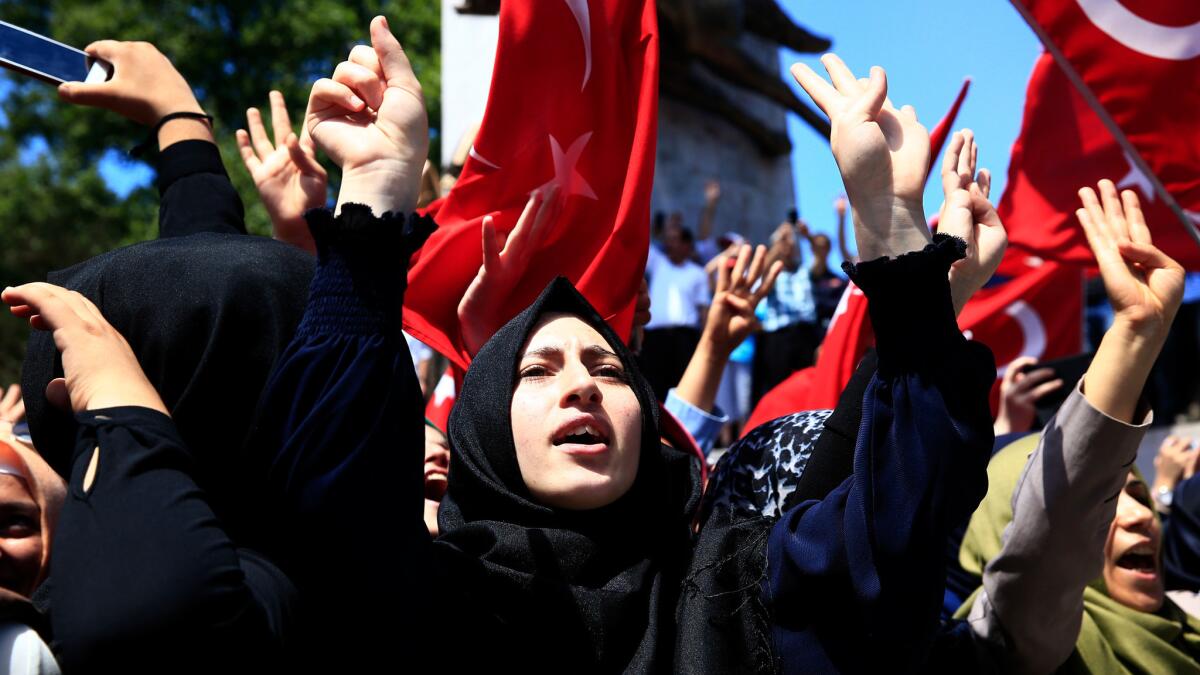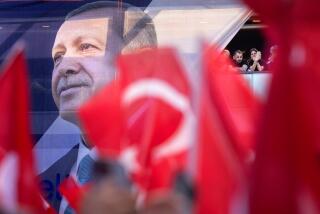U.S. officials assure Turkey of America’s support for democratically elected governments

- Share via
Reporting from Istanbul, Turkey — With tensions on the boil over Turkey’s demand for the handover of a Muslim cleric it blames for last weekend’s attempted military coup, President Obama telephoned the Turkish president Tuesday and assured him the U.S. does not support terrorists but will follow a lawful process before considering extradition.
Obama’s phone call to Turkish leader Recep Tayyip Erdogan was the first since the attempted coup by elements of the Turkish military Friday, and his forceful words appeared to be a direct response to Erdogan’s demand Monday that “the United States has to extradite” his political nemesis and onetime ally, Fethullah Gulen.
The two leaders spoke after the Turkish government announced a vast expansion of its purge, which grew to 50,000 military, police, teachers and civil servants – a fast-moving process that drew an implicit rebuke from Obama.
“It’s in times like this that it’s particularly important for the Turkish government and the Turkish people to adhere to the principles of democracy they have been fighting for and that they’re justifiably proud of,” spokesman Josh Earnest said, referring to Obama’s words.
Turkish officials said Erdogan replied that Turks, who turned out by the thousands to block the coup plot, had shown “great support for democracy.” He added that proceedings against those responsible will be in line with justice and the rule of law – something few in the country expect under Turkey’s politicized system of justice.
Turning to the extradition demand, Obama made some other things clear, Earnest said.
“The first is that the United States doesn’t support terrorists, the United States doesn’t support individuals who conspired to overthrow democratically elected governments. The United States follows the rule of law,” he said. The U.S. will follow the extradition process agreed to by treaty that would also provide due process for Gulen, Earnest said.
Obama spoke one day after Erdogan called Gulen a terrorist and a criminal and questioned how the U.S. could hold him in the face of an urgent demand from its NATO ally.
Erdogan’s spokesman, Ibrahim Kalin, told reporters Monday that the paperwork for an extradition request was being prepared.
Mevlut Cavusoglu, the Turkish foreign minister, had announced he was traveling to Washington Tuesday but canceled his plans on short notice to attend a meeting of the Turkish National Security Council on Wednesday.
Obama’s phone call came two days after Russian President Vladimir Putin contacted Erdogan, a delay that in itself bore testimony to the strained relationship. It seems unlikely to settle the dispute, which has taken on a far more bitter tone in the days since the Turkish military put down the revolt Saturday.
Warning signs that it could turn into a full-blown rift appeared in the pro-government media Monday in the form of accusations that the U.S. played a passive role, even as the rebels were shutting down airports, bridges and government offices in Ankara and Istanbul and attempting to seize top government officials.
Sabah, a leading pro-government daily, claimed in an editorial that Secretary of State John F. Kerry had failed in the middle of the coup attempt to say the U.S. stood in solidarity with Turkey and urge the military to return to their barracks.
But the White House and Kerry both issued strong statements during the attempted coup supporting the elected Turkish government.
Voicing “gravest concern” about the events unfolding in Turkey, Kerry said he’d stressed over the phone to Cavusoglu “the United States’ absolute support for Turkey’s democratically elected civilian government and democratic institutions.”’
Media accusations continued Tuesday when Yeni Safak, a pro-government daily, claimed Kerry had extended support to the junta by saying he hoped “there will be stability and peace within Turkey.” Columnist Ibrahim Karagul said that the U.S. government had used the Gulenist organization in an attempt to trigger a civil war in Turkey. The pro-government tabloid Gunes also said that western countries were silent while the challenge to the government was under way.
Taking note of the accusatory tone, U.S. Ambassador John Bass decried speculation in news reports and by some public figures that the U.S. in some way supported the coup attempt.
“That is categorically untrue,” he said, “and such speculation is harmful to the decades-long friendship between two great nations.”
The Pentagon said U.S. Defense Secretary Ash Carter telephoned Turkish defense minister Fikri Isik on Tuesday and among the issues discussed was Incirlik Air Base, a principal launch point for air attacks against Islamic State, but which has had limited operations since the coup attempt.
The Turkish government cut power to the base as well as all access after it learned that aerial tankers from the base had been used for air-to-air refueling for the rebel air force Friday and Saturday. But there was no indication when the base would return to full operations.
Although Turks of every political persuasion have voiced relief at the outcome of the weekend struggle, there were growing misgivings over the mass purges taken by the government in the days that followed.
On Tuesday the government announced that the thousands of people it was suspending included 15,200 employees of the education ministry and that it had demanded the resignation of 1,577 deans of state and private universities.
Special correspondent Gutman reported from Istanbul, Turkey, and Times staff writer Tracy Wilkinson from Washington.
ALSO
Turkish military staffers seek refuge in rival Greece
Failed coup in Turkey could allow Erdogan to tighten his grip on the troubled country
More to Read
Sign up for Essential California
The most important California stories and recommendations in your inbox every morning.
You may occasionally receive promotional content from the Los Angeles Times.











